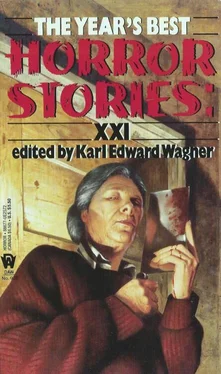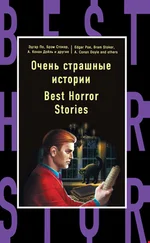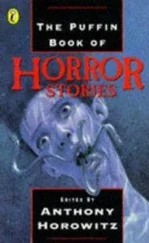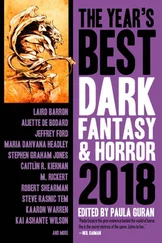“I don’t know what I said to the police, but somehow I led them back up to Court Number 2, shaking with aftershock. The Devil, Sir Michael Scott and the rest had gone.
“Richard lay slumped over the table in the well of the Court, covered in sea sand. He was still breathing. I turned him over, crying and calling his name, kissing him again and again to make him wake up—
“Then his eyes opened and I saw I was too late. He walked and talked, he even explained our way out of getting arrested for breaking into the Sheriff’s Court, but he wasn’t there. It was just—whatever’s left of a man when his soul has been stolen.
“I took him home and put him to bed, but I knew things couldn’t go on as before. I had to leave and start a new life, somewhere away from Kirkcaldy. For all his faults Richard had plenty of spirit. What was left didn’t have any at all.”
The girl finished her story and reached for her glass. Ettie said nothing, staring into her own vodka as if still collecting her thoughts on what she had heard. In various corners of the bar below them, where the Hyde’s remarkable acoustics had carried the story, regulars cleared their throats and glances were exchanged.
“You’re wrong, Jackie, or only part right anyway,” said a voice. The other two had scarcely noticed the newcomer’s arrival, toward the end of the girl’s story. Now as he leaned out of the shadows in the corner Ettie could see Jackie’s point: Richard Gibson’s eyes were empty windows, seemingly lacking that spark of life which all of us take for granted when meeting another’s gaze.
“The human soul’s a very messy piece of work,” said Gibson, continuing. “When the mob tore it out they must have left some behind: either that or the body is in some way attracted to where the soul has gone. I’m going to try and retrieve it, or at least be united with it, and I think this place is the start of the road.”
“If that’s your wish I’ll show ye the entrance,” said Ettie. “But perhaps ye’d care for a drink first? Ye’ve a long way tae go.”
Perhaps it was a trick of the Hyde ’s unpredictable light, but there seemed to be the faintest flicker, the slightest flash of something in the soulless man’s eyes as he accepted. Certainly he drained the glass straight down.
As he stood up to leave, Jackie edged round the table and put her hand on his shoulder. “I’m going with you,” she said.
Ettie nodded and smiled, or as near as her wizened features could approximate to that expression.
“Then perhaps we’ll see ye in here again,” she said, and led the way down the stairs.
“You must be Mad?”
The girl looked up from her green-jacketed Virago modern classic, and smiled a plain, unembarrassed smile at him.
“I’m Peter Mysliwiec.”
He sat opposite her. They were at a table in Mildred’s in Greek Street. Everyone else in the small room was a woman. That didn’t bother him. Karen was always telling him how tolerant he was. A hostile waitress—almost spherical and with a U.S. Marines haircut—took his order, and brought him a small expresso. He bought Mad a coffee, too.
They had never met before, but next week they would be married.
In the last month, he’d been forced to readjust most of his life. This was hardly stranger than the discovery that not only was he not British, as he’d always been told by his deceased parents, but that he was two years older than he’d thought, born not in London in 1947 but Warsaw in 1945.
Mad was late twenties/early thirties, and pretty obviously butch. Peter mentally rebuked himself for stereotyping people, but he was a commercial artist and often traded in stereotypes. Mad wore dungarees over an off-pink sweatshirt, shoulder-straps fastened with badges for causes he didn’t recognize. Her hair was cropped not quite so close as the waitress’, and dyed an early-Bowie orange. She had a faint mustache, bright eyes, and the first hints of a chubbiness she’d have to exercise as rigorously as Karen to avoid in the next few years.
“Well,” she said, “isn’t this strange?”
Peter was worn ragged. Maybe his parents had been wrong to lie their son’s way into British nationality. After all the letters and interviews, it was hard to imagine Poland as any more of a police state than the United Kingdom.
“I’ve never been married before,” Peter admitted feebly.
“Me neither. Obviously.”
Mad was the ex-girlfriend of someone Karen knew at the agency. Peter knew almost nothing about her. Karen, inextricably still married to the Dreaded Stanley, was the kind of agent who could get anything given a week or so. A roll of discontinued wallpaper, a particular back issue of National Geographic, an aviation expert with photographs of a Sopwith Camel, a marriageable lesbian.
“What do you do?” Mad asked politely.
“I’m an artist. Book covers, mostly. Ads, sometimes. A movie poster, once in a blue moon. And you?”
“Different things. I’m sort of changeable.”
“Um.”
They didn’t really have much more to say, but he felt it important to meet the girl. He’d seen the Gerard Depardieu film about the couple in the arranged marriage who were persecuted by U.S. immigration agents, but Karen had ascertained that someone with his history of residence and skin coloring would be unlikely to suffer much. “Remember,” she had said, “you’re a white, middle-class, house-owning, male heterosexual. In the lottery of life, you’ve won already.”
Peter got his checkbook out.
“I suppose we should, um, do the business? We agreed on five hundred pounds?”
Mad’s face didn’t change.
“-leine or -line?”
“Madeleine, e before i and no c in sight.”
He asked her surname, and she told him. Peter wrote out a check to Madeleine Waters, and gave it to her.
“No one’s ever paid for me before,” she said. Peter wondered if she had something in her eye.
“Here are the details,” he said, giving her a sheet of paper on which Karen’s male secretary had typed the address of the Registry Office and the time of the wedding.
She pressed the check between the pages of her book and stuffed it into her shoulderbag. Then, she stood up to leave. She wore Doc Martens.
“See you in church,” she said, leaving him to finish his expresso.
A week later, Peter was outside the Registry Office in Camden. Karen was to be the witness, and Tony Weldon, his accountant, was the best man. He’d worn a suit, but there was no dress code for a sham wedding. Karen wore a suit, too, and was reminding him about the deadline for the Bloomsbury cover. She’d bought him a boutonniere, and fixed it to his lapel.
“Is this her?” Tony asked. Peter looked. A girl was walking down from the tube station, combat boots clunking, hands in the pockets of fatigue pants, green braces over a nondescript T-shirt. When she was close enough for them to make out her face, he knew it wasn’t Madeleine.
“I hope she won’t be late,” Karen clucked. “Jeannie said she wasn’t always reliable.”
“You’re talking about the woman Peter’s going to marry,” Tony said in mock outrage. Karen humphed elegantly at him.
She squeezed Peter’s arm, and got close to him. She’d been a pillar of the proverbial during the harassment.
“Nice day for a white wedding,” Tony hummed.
“Most important day of your life,” Karen said, unable to resist it.
“What was yours like?” Tony asked.
“Very romantic,” Karen deadpanned, “with the moonlight gleaming on the Dreaded Stanley’s brass knuckles.”
Peter grinned. He would get used to the jokes. Karen had already started calling him “adulterer” in bed.
Читать дальше












